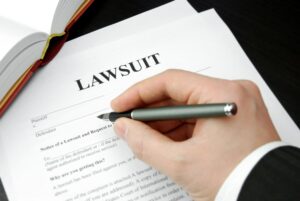Alternative Dispute Resolution, commonly known as ADR, is a method of resolving legal disputes outside the traditional courtroom setting. Only some lawsuits or conflicts between parties will end up in a hearing in court in front of a judge or jury.
You may have numerous options to resolve your controversy without risking a jury or bench trial. You may have the opportunity to choose the method of case resolution that works best for you, whereas other times, you will not have a choice.
Either way, you need to know what ADR involves and how it can impact your case.
Even though ADR may be less formal than a trial, you still need the help of a litigation attorney throughout the process. ADR can determine the result of your case and impact whether you may go to trial.
A litigation lawyer brings their experience, advocacy skills, and strategic thinking to the table. They can present a thorough case on your behalf or represent your position in settlement negotiations.
Strategy and tactics are some of the main reasons you should hire a litigation lawyer, and deciding whether to engage in ADR is one of your most important choices.
Actual Trials in Lawsuits Are Very Rare

Even when one party has filed a lawsuit (or both have filed counterclaims against each other), rarely will any type of litigation go to a trial. For example, in a personal injury context, only 4 to 6 percent of cases end up in front of a judge or jury for a decision.
Both parties have too much to lose by taking the risk of going in front of a jury. The plaintiff can come away with nothing, or the court will order the defendant to pay a lot of money. Neither party wants to take the chance that the outcome may happen, so they may reach a settlement agreement that results in the dismissal of the lawsuit.
There are numerous ways that a case can reach a resolution before trial. In addition to a settlement agreement, a court can dismiss the case entirely because of a motion from one of the parties.
However, that is a rare outcome, and settlement is the more likely result of a case. The plaintiff will realize that they are better off taking less than the amount that they originally asked for, while the defendant understands that paying some money is better than the risk of leaving everything up to a jury.
Mediation Is the Most Common Form of ADR
Sometimes, the parties negotiate directly through their attorneys to reach a settlement, and they may do so at various stages in the case. For example, the defendant may begin to try to negotiate a settlement when the court denies their motion to dismiss the case.
Then, they realize they are in it for the long haul, potentially incurring many legal fees to defend against the case. Settlement negotiations can intensify after discovery when a party realizes the strength of the other’s case.
The two parties may need some help to make progress towards an agreement. They may have tried to talk before but realize they are having trouble getting closer to being on the same page. The parties may have made some progress toward an agreement, but they need someone to help get them across the finish line.
Remember that money may not be the only thing the parties negotiate in a settlement agreement. Someone’s other rights may be at issue in the court case, which can come into play when the two parties attempt to negotiate.
In some cases, the court may request that the parties engage in mediation. The judge may believe that the case has potential for settlement and that the litigants should talk more before proceeding down the trial path.
The court may mandate mediation during the trial process before the case reaches a jury. In any event, it never hurts to get help talking to the other side in the case to explore the possibility of a settlement. A mediator is a trained professional who works to get parties to talk.
They may find common areas of agreement that they can help you build on before you tackle the more complex issues. They may speak directly to the parties or attorneys to convey their position.
A mediator has no authority to make any decisions, but they can certainly give their opinion. Along the way, they work to build a consensus that can lead to a settlement.
Remember that rules of evidence make evidence of settlement negotiations inadmissible in court during a trial. Therefore, you can engage in mediation and other settlement discussions without the fear that discussing the case can show your position is weaker.
The law wants to encourage parties to a lawsuit to speak as much as possible because trials are not necessarily the most favored outcome in your case.
Arbitration

There is a process that can lead to a decision in your case without the need for a full-blown trial in court. In arbitration, a neutral third party can render a binding decision in your case after a legal process. Usually, neither party can appeal the result in court.
Some parties prefer arbitration to litigation because it involves less risk and lower costs. Businesses often include a provision in contracts that requires customers to arbitrate disputes rather than taking them to court.
Courts have usually upheld these arbitration clauses. Some litigants want to go to court because they can gather evidence through discovery, and a jury is more of a wild card that can award them even more money.
When you go through arbitration, you still have the legal right to some of the legal process you will get if your case goes to court. There will still be some forms of discovery that are allowable. The individual arbitrator or arbitrators will set the rules in the case, and several organizations of arbitrators have model rules for their proceedings.
Arbitration can lead to a quicker result in your case, and an objective third-party neutral can still make the decision. If there is a legal agreement ahead of time between you and the other party, you may have no choice but to head to arbitration. The court almost always enforces these agreements, and you will have no choice but to arbitrate.
Outcome Prediction
Before you proceed to trial, you should get a sense of the merits of your case and its relative strengths.
For example, a defendant may not realize the extent of the problem that they have on their hands and how a jury may receive their case. The last thing they want is to learn the hard way when a jury orders them to pay a large amount.
At the same time, a plaintiff may think their case is stronger than it is, and they may be pushing their luck if they go to trial.
A third-party neutral party can evaluate each party’s cases, and the litigants may get a certain amount of time to present their case to someone other than the judge or jury (although sometimes a judge may offer this to the parties).
After the procedure, the neutral party will indicate how they may rule on the case if they made the decision. Then, the party who may lose if the case goes to court will have even more incentive to settle the case. Sometimes, a judge may offer their own prediction on what may happen if the case goes to a jury.
Settlement Conferences
The judge may play a role in facilitating a settlement between the litigants and will meet with the parties to let them know how they view the case (even if it is a jury that will make the ultimate decision).
The judge is interested in fairness and efficiency, even though each party has the right to a trial when someone files a case (and the judge declines to dismiss the case or grant a motion for summary judgment). The judge may tell one or both parties that they do not have a strong case and should consider a settlement before the trial.
The judge may become more aggressive in pushing a settlement after the close of discovery. They may convey what their experience and reading of the law tell them about the potential outcome of the case.
The parties should certainly listen to anything the judge says about the case, even though they still can go to trial. Judges typically have an accurate read on how the case will unfold, especially if they are the ones who will make the ultimate decision.
The Benefits of ADR

If you engage in ADR, whether it is a choice of your own or you must do so, there may be benefits for your case. Any time you go on trial, you take many risks.
First, you may need to pay litigation costs, and depending on your agreement with your attorney, you can pay more in fees the longer the case goes on. Business litigation can take years from start to finish.
Not only do you have to work your way through a lengthy litigation process, but the unsuccessful litigant may file an appeal that can add even more time to the process. In addition, there is always a risk when a jury decides a matter.
If a judge decides your case, they may have their own view of the law not shared by other judges, even though they all follow the same legal precedent. The trial court establishes and finds the facts in the case, and you may be unable to prove your case to the judge’s satisfaction.
Thus, ADR can provide you with a way to circumvent a risky and costly litigation process.
Another significant advantage of ADR is its flexibility. Unlike litigation, ADR allows parties to choose the process that best suits their needs and customize the resolution to their unique circumstances. It can also take less time and cost less compared to lengthy and expensive court proceedings.
ADR typically promotes greater confidentiality and privacy, which parties seeking to protect sensitive information or maintain business relationships may prefer.
How a Litigation Attorney Can Help Your Case

ADR proceedings can require an understanding of the legal system and the specific laws relevant to your case. You need litigation strategy and tactics to win your case, and your choices during the litigation process can determine your results.
A litigation attorney can help assess your case and advise how to achieve the best possible outcome. They can help you build your case in a way that gives you more leverage if you engage in any ADR. It always helps to negotiate from a position of strength, which you may achieve if your court filings are persuasive. You obtain compelling evidence in the discovery process.
In addition, a litigation lawyer can provide valuable insights and perspectives you may not have considered on your own. They can evaluate the strengths and weaknesses of your position and develop a strategic approach to achieve the best possible outcome.
Their experience in litigation and dispute resolution can be invaluable in guiding you through the ADR process and helping you make informed decisions.
Hiring a litigation lawyer before filing a lawsuit is always better. In most cases, you will know that there is a potential dispute between you and another party. Your attorney can join you early in your case and help you explore a negotiated solution without even the possible need for litigation in the first place.
Contact An Experienced Litigation Lawyer Today
If you do not already have a litigation attorney for your business dispute, now is the time to contact one. Your civil litigation lawyer can explain your case’s strength and your options going forward.
Do not hesitate to reach out to a skilled civil litigation lawyer at Gallian Firm who can guide you through the ADR process and help you achieve a favorable resolution.